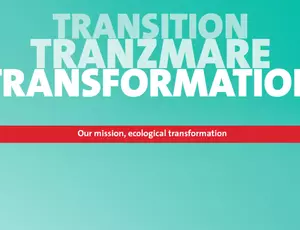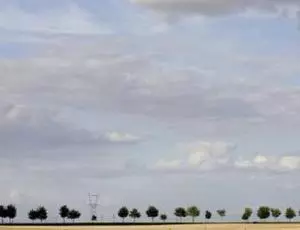COP26 is due to be held in Glasgow (UK) between 31 October and 12 November, some six years after the Paris Agreement was signed.
The conference is aiming to strengthen and accelerate global action in an effort to reduce GHG emissions by 55% and limit the temperature rise to 1.5°C by 2100. The battle to prevent global warming not only lies in the hands of the world's nations, but also depends on the commitment of the corporate world to spearhead an even more ambitious series of climate strategies. In alignment with the recommendations of the scientific community, Veolia is unveiling an action plan featuring a scaled-up set of climate commitments.
Champion of ecological transformation, Veolia will be exemplary for the climate
The challenge is a daunting one and involves meeting the growing level of global energy demand (a 30% increase by 2040) while curbing pollution and protecting natural resources. Unfortunately, the knock-on effects of climate change are becoming more pronounced, including the rise in natural disasters, the depletion of water resources and the increase in climate migration.
According to Veolia CEO Antoine Frérot,
The new Veolia is in the ideal position to provide solutions to the major challenges facing the environment and society, and top of the list is climate change. We need to ramp up the transition towards carbon neutrality and accelerate the process of adapting to climate change. Veolia possesses the three key assets to successfully lead the ecological transformation, i.e. strong climate commitments, the ability to pioneer new solutions funded by green investments, and integrated solutions allowing its municipal and industrial customers to decarbonise their activities and adapt to the effects of climate change.
Veolia scales up its climate commitments
In its report published on 6 August 2021, entitled The Physical Science Basis, the Intergovernmental Panel on Climate Change (IPCC) concludes that the climate is changing all around the world faster than expected: we no longer have any choice, the rise in temperatures must be limited to 1.5°C by the end of the century if we are to meet the goals of the Paris Climate Accord.
That explains why Veolia is conforming to the Science Based Targets initiative (SBTi)(1), which mobilises companies to set science-based targets in the transition to the low-carbon economy. As such, Veolia is aiming to double its 10-year goal of reducing its GHG emissions through two strategies in particular, namely phasing out the use of coal in Europe by 2030 and increasing methane capture rates at waste storage centres. The quantified objectives are currently being defined. They will be validated in 2023 and enshrined in the Group's new strategic plan..
On 27 September 2021, Antoine Frérot consequently signed the SBTi's Business Ambition for 1.5° C(2). This commitment doubles the Group's efforts compared to the ambitions adopted in 2019 (22% GHG reduction by 2034). In the long term, Veolia is aiming to achieve "net-zero emissions" by 2050.
Wherever the Group does business, it will comply with the most demanding climate scenario (+1.5° C in 2100). Its residual emissions will subsequently be neutralised, such as by using sequestration techniques. This commitment concerns the scope of the new Veolia, which includes the Suez entities. The price of carbon will also be incorporated into its investment decisions.
Greenpath: 100 Veolia solutions for its customers' low carbon and resilience strategies
To support and guide its municipal and industrial customers with their low carbon and climate change adaptation plans, Veolia is offering the Greenpath range of 100 solutions to reduce their carbon footprint across their entire value chain, according to IPCC Scopes 1, 2 and 3(3).
For example, Veolia will supply low-carbon plastics, or replace the coal used to power an urban heating network with a mix of biomass, refuse-derived fuels (RDF) and waste energy from industrial sites. Another example: to adapt to climate change, the Jourdain project, the first of its kind in Europe, reinforces drinking water reserves during the summer by reusing wastewater from the Sables d'Olonne treatment plant that has been refined in a natural wetland.
Veolia's participation in COP26
- 9 November: Veolia CEO Antoine Frérot will take part in the business sequence organised by the Marrakech Partnership for Global Climate Action.
- Three webinars will present Veolia's mitigation and adaptation solutions:
1. "Energy: decarbonisation and the future of energy", with Veolia UK, Europe (Northern, Central and Eastern) and North America.
2. "Water: desalination, reuse of wastewater, digitisation", with Veolia Africa-Middle East and France.
3. "Waste: plastic recycling, refuse-derived fuels, biogas and others", with Veolia Australia-New Zealand, Latin America and Asia.
- During the 12-day COP26 conference, the Group will present a solution for the climate every day: energy efficiency in industry; RDF and biomass cogeneration; biogas capture, production and recovery; supply of low-carbon plastics; organic fertilisers and bioconversion for producing energy from biowaste; water reuse; energy efficiency of buildings; desalination; low-carbon water and wastewater treatment networks (positive-energy treatment plants); microgrids (local waste-to-energy strategies, energy storage and electrical flexibility); carbon capture, utilisation and storage (CCUS); and hydrogen.
- The directors of the Group's major geographic zones will also offer insights into their climate challenges and their proposed solutions.
(1): The Science Based Targets initiative (SBTi)
The SBTi mobilises companies to set science-based targets and boost their competitive advantage in the transition to the low-carbon economy. It is a collaboration between CDP, the United Nations Global Compact, World Resources Institute (WRI) and the World Wide Fund for Nature (WWF), and one of the We Mean Business Coalition commitments. The initiative defines and promotes best practice in science-based target setting, offers resources and guidance to reduce barriers to adoption, and independently assesses and approves companies' targets.
(2): Business Ambition for 1.5°C
Business Ambition for 1.5°C is an urgent call to action from a global coalition of UN agencies, business and industry leaders, in partnership with the Race to Zero. Companies are committed to setting ambitious science-based emissions reductions targets. By aiming for a "net zero" target in line with +1.5°C in 2100, 900 companies are making a critical contribution to limiting the worst impacts of climate breakdown.
(3) : IPCC scopes
- Scope 1: Sum of direct emissions caused by burning fossil fuels (oil, gas and coal) that are owned or controlled by the company.
- Scope 2: Sum of indirect emissions associated with the purchase or production of electricity.
- Scope 3: Sum of all other indirect emissions.
The 26th UN Climate Change Conference (COP26) will be held in Glasgow (UK) with a series of online and in-person events between 31 October and 12 November. The conference will see the United States' much anticipated return to the Paris Agreement, which is the first legally binding global agreement on climate change adopted during the COP21 conference in December 2015.



